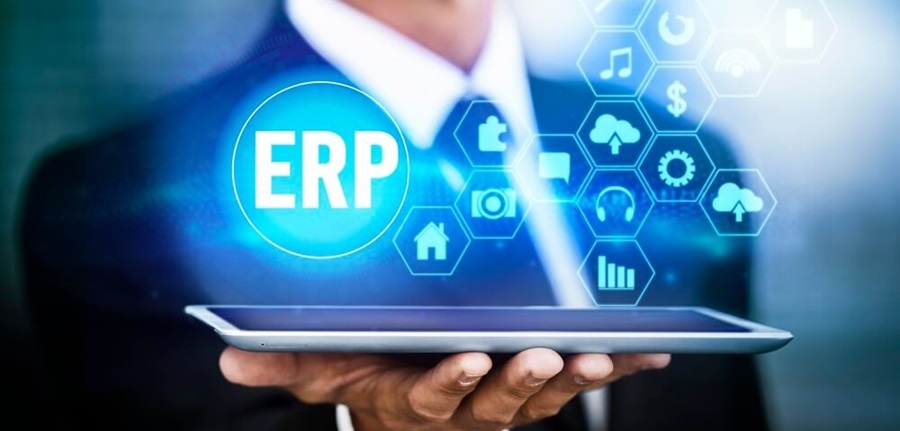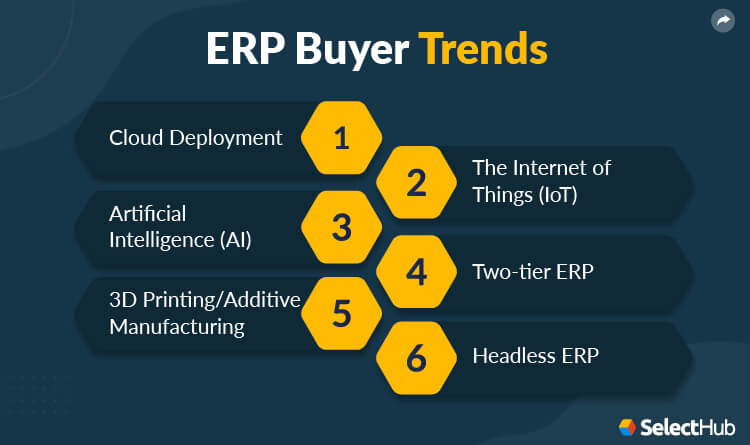What Is ERP? A Complete Guide On ERP Solution
- Aditya
- February 6, 2024

Table of Contents
The modern business world demands a smart solution to reach the competitive edge and enhance growth. Handling spreadsheets, and manual data handling slows down the competitive edge of any growing business, that’s where ERP comes into play.
By implementing an ERP solution ensures success for your business, gives you that competitive edge, and streamlines your entire business operations.
What is ERP?
ERP offer a centralized platform for all your business processes and enable access to real-time data among your employees and various departments.
It collects business-shared transactional data from multiple sources, eliminates data duplication, and provides data integrity within a single platform.
ERP systems tie together various business processes and enable the flow of data between them. Enterprise Resource Planning system, is a networked solution that effectively handles all your business processes.
What are the Challenges Businesses Face Without Implementing ERP Systems?
Without an ERP solution, businesses often struggle with inefficiencies caused due to dependency on various systems and manual processing of data that result in slow progress.
Siloed departments, collaboration gaps, and relying on spreadsheets often led to data errors, duplication, and lack of visibility of the key business processes.
Hence, it is crucial to give your business a transformative edge, to evolve and grow with ERP. An ERP enables your business to reach a competitive edge and enhance growth.
Importance of ERP for Modern Business:
ERP system is the backbone for any business, it helps you to manage the resources wisely.
Businesses prioritize handling data and finance resources effectively by streamlining their business process, to save money and time, without compromising on quality or performance.
It also enables businesses to conduct effective planning and coordination among employees, to get detailed information on their projects, manage financial assets, employees’ work progress, and more.
As a comprehensive solution, it fosters numerous benefits to businesses such as collective data sources, collecting reports. And also it help to get analytics and real-time views on project progress and employee work activity.
In total, it is a complete solution that provides businesses the access to manage all their business cores and functionality through a single platform that enhances productivity and business growth.
Key Features:
ERP system is designed to handle the core business process, hence it offers numerous features that enable a business to effectively manage their core activity in a single platform.

The major features an ERP provides are:
- Data management: ERP system enables businesses to effectively manage data and get real-time access to it within a single platform.
- Financial management: With ERP you can easily keep track of all the expenses, and material costs, plan project budget, measure profits, and everything within a single platform.
- Collaboration: It enables users to effectively collaborate and communicate with every department within a single platform.
- Track Project progress and employee work activity: An ERP enables users to easily track project progress in every stage from planning to successful execution. It also enables you to track your employee activity when they are on-site or outside of the work premises.
- Automation: Businesses can automate repeatable business tasks, such as invoicing, payroll, order processing, reporting, and more. This helps your business minimize the time spent on manual data entry, eliminates errors, and lets your employees work on value-added tasks.
- Data Analysis: The power of data analytics enables employees to collect a wide range of information and employees to collect a wide range of information and transform it into actionable insights.
Modules:
Customer Relationship Management (CRM):
ERP systems with integrated CRM software enhance customer relationships and streamline the sales process.
With CRM your business can manage all customer information, purchase orders, and purchase status. It also enables your business to automate processes like filling out POs, generating account receivable reminders, and more.
Supply Chain Management:
The supply chain management module enables businesses to get a real-time view of the flow of goods from manufacturing to the customer’s hand.
Are you looking for a ERP Software
It enables production to run smoothly to ensure all materials are available and reach the correct locations and accurately schedule machinery and labor resources.
Project Management:
The Project management software enables businesses to effectively plan, manage, execute, and track project progress in real time. It also simplifies the client billing process and encourages smooth collaborations among project members.
Procurement:
The procurement or purchase management application enable businesses to effectively manage raw materials and purchasing of goods.
It automates requests for quotes and purchase orders and minimizes overbuying and underbuying of goods and materials.
Inventory Management:
The Inventory Management shows the current inventory level and provides real-time updates. Businesses can also measure the major inventory-related metrics, that are essential for any product-based companies to optimize stock on current and forecasted demands.
HRMS:
The HRMS and Payroll Software enables businesses to smoothly manage employee records, get performance reviews and available PTO, and can implement the workforce trends across various departments and demographics.
Manufacturing:
With ERP your business can boost efficiency in the manufacturing process, and assist with product planning, raw material sourcing, and forecasting.
Other components it offers are bill of materials, shop-floor control, distribution planning, work-order management, and product tracking.
Data Management and Sharing:
It enables businesses to manage data efficiently and access it whenever required. Also, employees can handle data across various departments over a centralized platform, and this data can be easily shared across other departments.
ERP Implementation and its challenges:
ERP implementation is a multi-phase initiative that ensures restructuring business processes, data migration, training employees, and managing software and its components.
Every organization is now considering ERP Implementation or its modules that are necessary for their business.
As such, by adopting ERP software, your business might need to replace the existing system, whereas some ERP is flexible and can be implemented across the existing system.
The implementation varies as per the various needs of the business and the types of ERP you adapt for your firm.
ERP Deployment Option:
The various ERP deployment modules fulfill the needs of different organizations, and it’s crucial to understand the unique characteristics of each, so you can choose the best options for your business.
Self-Hosted:
The self-hosted edition enables businesses to run the ERP solution on their servers and is responsible for maintenance, security, upgrades, and other fixes.
Earlier, Self-hosted ERP was only available, this enhances a higher level of security as the server runs under the business’s own server.
Cloud:
Cloud-based ERP can easily run on remote servers managed by third parties. Users mostly access the cloud ERP through web browsers that enhance flexibility and can access information and reports from anywhere with an internet connection.
Open-Source ERP:
Open-Source ERP is cost-effective and sometimes it is available free of cost offered by a few ERP providers.
Also, few ERP providers offer businesses to use their software for free and charge a low annual fee when the customer wants cloud access.
Top ERP Solutions by Company Size:
The ERP system fulfills your business needs depending on the size and specific needs.
Modern ERP Solutions, like IYRO ERP, Oracle, and Acumatica can perfectly meet the needs of small businesses.
It offers all the essential features and functionalities required for handling day-to-day operations.
Whereas mid-sized businesses get benefits from ERP solutions like IYRO ERP, Oracle JD Edwards, and Oracle Netsuite, that can easily cater to the unique requirements and complexities faced by organizations.
Large organizations’ ERP software are IYRO ERP, SAP S/4 HANA, which deliver a comprehensive range of modules, features, and tools to manage complex business operations and processes.
These best ERP software are highly scalable and ensure they can grow and adapt to the needs of your organization.
Future of ERP:
Businesses around the world have understood the benefits of an ERP solution, and looking for ways to up their business operations.
Technology such as Artificial Intelligence, the Internet of Things (IoT), Augmented Reality, and Blockchain, are shaping today’s ERP trends.
Most of these ERP trends are already adapted by leading ERP solutions.
AI and ML:
AI and ML for ERP enhance a future of automated processes and workflows, revolutionize data analysis, better decision-making, and more.
Artificial intelligence integration over ERP enables the automation of repetitive tasks and makes the ERP system more efficient.
ML integration provides ERP to enhance predictive analysis, business can forecast trends, and automation.
Blockchain for Supply Chain Management:
Blockchain enhances transparency among industries in the supply chain. It provides the status of any particular product in detail and creates an in-depth audit trail of a product journey.
AR:
The demand for Augmented Reality has increased in retail industries, that offers a 3D image of a product, that provides a sense to customers on how it would look.
The ERP stores all the data points and images and uses them further in the future.
Internet of Things (IoT) Integrations:
IOT synchronizes machines to software that helps to effectively monitor the status of sold goods, packaged, produced, and more.
These developments are enhancing more robust and innovative ERP solutions that enable organizations to optimize their operations.
Research by Gartner reveals that 40% of service companies will unite the core process into a single platform by 2026.
Effectively Handle your Business Operations with IYRO ERP:
IYRO Enterprise Resource Planning (ERP) solution is a perfect choice for every business, who are looking to get immediate results and sustainable growth.
Our ERP software is a web-based solution that offers unmatched flexibility and scalability.
So empower your business with a seamless solution that empowers your organization to easily adjust with the shifting business needs.
Our ERP offers advanced features, real-time data, and enhanced quick decision-making to industries that are looking to stay agile and competitive in today’s dynamic landscape.
